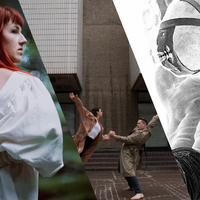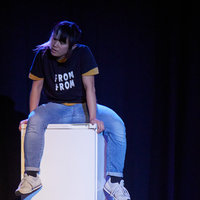Wed 24 Jan: Francesca Matthys, Joshua Yates and Wency Lam

News Story
Francesca MatthysStap (St-AH-p)
Joshua YatesYonder
Wency LamDear Adult,
Francesca Matthys’Stap (St-AH-p) is an impactful reflection upon the choreographer's connection to her South African heritage. A pulsing beat is heard, prompting Matthys to journey around a dimly lit square-shaped pathway with rhythmical steps; her feet slapping the floor to the beat. The soundscape’s complexity escalates, and similarly, Matthys’ movements become passionate and urgent. The music stops, yet she continues to dance to the sharp exhalations of breath and slamming feet. Besides a few effective still points, Stap (St-AH-p) is an unceasingly vibrant piece, abundant in repetition, and almost at points, manic. It may benefit from indulging in the slower sections, though in the same breath, it certainly still contains some thought-provoking moments. The use of speech is highly affective at times such as in the impressionable line, ‘I leave without you, even though you are a part of me’.
Yonder is an abstract work dealing with identity and relationships by Joshua Yates. Though ambiguous in its narrative, Yonder successfully indicates themes of otherness and contention. A group begins on stage, before promptly shifting into a solo of inflicted movements and self-manipulation. Visible pain on the soloist’s face beckons the audience to consider the dancers' separation. A duet ensues, followed by the rejoining of the group. Arguably, the group work generates the piece's most impactful moments - a notable example lying in the eruptions of argumentative chatter. The cast members are commendable for their mutual connections to facilitate this. Yonder closes with a comparatively peaceful solo, suggestive of solitude, yet contentment.
Dear Adult by Wency Lam is a poignantly comedic piece which asks the audience to listen inward. With cartwheels, astronauts, piggy backs, butterfly wings and a xylophone, there is a catalyst for every audience member to reconnect with their childhood. A narrator guides us through an all too familiar story of a lonely child with a powerful imagination to keep her company. After much fun and games, we witness the child jump down a ‘rabbit hole’ and refuse to come back, seemingly deaf to the narrator’s calls, exasperating the narrator to no end and entirely derailing her narration. Eventually, she has no choice but to follow the child down the rabbit hole. After quite the duel, they reconcile, and we are left with an emotive message from the child: ‘Don’t forget that I am here. This part of you is safe with me’.
Emma van Boolen
Francesca Matthy’s steps beat a steady rhythm. Gradually her movements gather speed, building in rhythmic complexity until her dance spills into a new configuration and the cycle begins again. Each section of STAP (St-AH-p) brings Matthys a physical exploration to simultaneously work through and break out of. Sometimes it feels like Matthys’ movements are tracing memories and, when speech intersects one of these cycles, her words suggest something held close yet left behind. Drawing from Matthy’s ‘Stepping in Situ’ practice, and supported on-stage by Michael Mendones' varied musical accompaniments, STAP’s (St-AH-p) strength is in the studied detail of its movement and the balance it strikes between a dance of restriction and of letting go.
Joshua Yates’Yonder plays with a state of brooding tension. Though its five dancers are dressed identically, the piece seems to centre around one dancer’s inner conflict; sometimes hinted at in solo or duet moments, sometimes engulfed by the unifying physicality of the group. Throughout Yonder these moments of unison are strong, yet the more intricate physicality is found in the work’s solos, where tense and isolated movements soften seamlessly into fluid spirals. In an abrupt change, the dancers erupt into speech; a barrage of words and emotions indecipherable from each other. It’s a choice that clearly conveys an outburst of pent up frustration, yet it feels harsh. As a loud and literal turn in an otherwise abstract work, Yonder would perhaps remain stronger by delving deeper into its physicality.
Dear Adult, is a playful reflection by Wency Lam on the imaginative worlds we create in our childhood and continue to carry with us - if we can only remember and revisit them. Here, moments of childlike wonder are conjured through props and costume design; from a pair of iridescent light-up butterfly wings, to a tutu skirt that becomes the portal to another world. While the presence of a narrator, who speaks to the audience as if a group of children, ensures the narrative of Dear Adult, is clear, the script doesn’t always leave enough room for the imagination. Mostly the audience are told and shown, rather than having the space to experience their childlike creativity awakened. Still, the physicality of Dear Adult, is fun, and a fight scene referencing the protagonist's beloved anime worlds is a perfectly pitched close.
Rachel Elderkin


